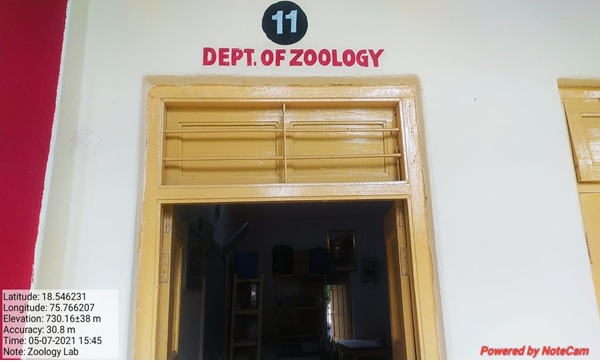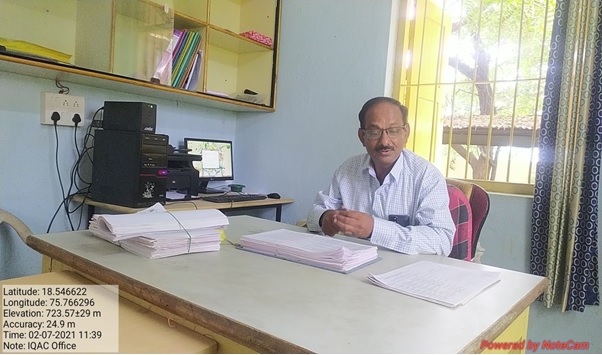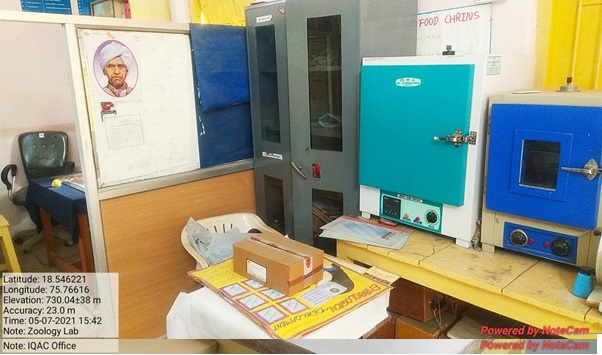Department > Science > Zoology
Department Profile:
The Zoology department was established in 1989 and emerged as the best learning center in the college, affiliated to Dr. Babasaheb Ambedkar Marathwada University, Aurangabad. At present, the Zoology department is well furnished with well-qualified staff, which runs UG courses. The current teaching areas in the department include Animal Systematic and Diversity, Cell Biology, Genetics, Fishery Science, Animal Physiology, etc. The department has a well-equipped laboratory with LCD Projectors and consists of various instruments like electrophoresis, pH meter, microtome machine, Oven and Research Microscope etc. The well-equipped laboratory forms the backbone of the department by contributing significantly to the practical adeptness of the students. The overall strength of the students is increasing day by day, the department faculty always putting efforts to inculcate knowledge and research attitude amongst the students. Every year the department actively participates in International, National, State level conferences and Seminars.
Intake
| Sr No | Year | Intake | Intake Capacity |
|---|---|---|---|
| 1 | Year 2015-16 | 0 | 120 |
| 2 | Year 2016-17 | 0 | 120 |
| 3 | Year 2017-18 | 0 | 120 |
| 4 | Year 2018-19 | 0 | 120 |
| 5 | Year 2019-20 | 0 | 120 |
| 6 | Year 2020-21 | 0 | 120 |
Teaching Staff
|
Sr. No. |
Name of Faculty |
Designation |
Qualifications |
View Profile |
|
1 |
Dr. Garad V.K. |
Professor & Head |
M.Sc., Ph.D., B.ed |
|
|
2 |
Dr. Ashok Dasrao Humbe |
Assistant Professor (CHB) |
M.Sc. in Zoology, B. Ed., Ph. D |
Courses & Syllabus:
|
S.N. |
Course |
Syllabus |
|
1 |
F.Y.B.Sc. |
|
|
2 |
S.Y.B.Sc. |
|
|
3 |
T.Y.B.Sc. |
Programes & outcomes:
The students completing the B.Sc. programme successfully is expected to have following outcomes.
- The students explain the basic principles, concepts in science.
- Understanding the issues related to nature and environment.
- To understand the practical applications of subject in day-to-day life
- Understanding the relationship of man with the environment to make life eco-friendly
| Sr No | Name Of the course | Outcomes |
|---|---|---|
| 1 | Protozoa to Annelida ( Z-101 ) |
|
| 2 | Cell Biology ( Z-102 ) |
|
| 3 | Arthropoda to Echinodermata ( Z-201 ) |
|
| 4 | Genetics I ( Z-202 ) |
|
| 5 | Vertebrate Zoology ( Z-301 ) |
|
| 6 | Genetics II ( Z-302 ) |
|
| 7 | Genetics II ( Z-302 ) |
|
| 7 | Biochemistry and Endocrinology ( Z-401 ) |
|
| 8 | Ecology ( Z-501 ) |
|
| 9 | Evolution ( Z-502 ) |
|
| 10 | Fishery Science-I ( Z-601 ) |
|
| 11 | Fishery Science-II ( Z-602 ) |
|
Research
Prof. Dr. Garad V. K.
Presently working as Professor and Head in the Department of Zoology in our
college. He has more 28 years teaching experience to UG. He has participated and
presented his research papers in National Conferences. He has published Eleven (11)
research papers in National Journals/ Conference proceedings and published one
book. He has organized one National Conference and as a Co-Convener, he has
organized Two (2) State level Seminars. He is recognized research guide of Dr.
Babasaheb Ambedkar Marathwad Unversity, Aurangabad since 2002. Under his
supervision, Three Students are working and Two Students are registered for Ph. D.
Degree.
| Sr No | Title Of Paper | Name Of Journal | Year Of Publication | ISSN Number |
|---|---|---|---|---|
| 1 | Intestinal Histopathology Of Clarias Batrachus (Linn) Parasitized By Caryophyllaeid Cestode. | Journal of inland fish society of India | 2002 | ISSN0379- 3435 |
| 2 | Population Dynamics Of The Cestode Parasites From Fresh Water Fish,Channa Species. | Journal of association zoology India | 2006 | Reg.of F.19670 |
| 3 | On New Species Of Pseudocaryophyllaeus Marathwadensis Cestoda – Caryophyllaeidae,Leuckart From Clarias Batrachuu At Osmanabad. | Ecology and fisheries | 2015 | ISSN0974- 6323 |
| 4 | Biodiversity Of Fishes From Sangameshwardam Dokewadi | International journal of advanced research | 2015 | ISSN23944072 |
| 5 | Histopathological Studies Of | Basic and applied sciences | 2017 | ISSN23199318 |
| 6 | Wallagoattu (Bleeker) Infected With Gangesia Seenghali Hiware 1999 | Vidyawarta | 2018 | ISSN23199318 |
| 7 | On Lytocestus Bangangesis N.Sp. Cestoda Lytocestidae Hunter From Clarias Batrachusat Osmanabad(M.S) | Vidyawarta | 2018 | ISSN23199318 |
| 8 | Seasonal Temperature Variation And Their Influence On The Level Of Ph Dissolved Oxygen And Carbon Dioxide In Sina River Water Osmanabad | Vidyawarta | 2019 | ISSN23199318 |
| 9 | On New Species Pseudocaryophyllaeus Ujjanesis Cestodacaryophyllaeidae Leuckrt From Clarias Batrachus At Solapur | Ecology and fisheries | 2020 | ISSN09746323 |
| 10 | Stuies On Incidance Of Infection And Intensity Of Infection Of Cestode Stilesia From Capra Hircus | Power of knowledge peer review journal | 2020 | ISSN23204494 |
| 11 | On A New Cestode Of Genus Gangesia Woodland 1924 From Fresh Water Fish Wallago Attu At Kallamb Dist Osmanabad M.S India | Vidyawarta peer reviewed international journal | 2020 | ISSN93199318 |
Activities
| Sr No | Activities |
|---|---|
| 1 | Two days the College organized National Conference on “Biodiversity and its conservation” during 30th and 31 January 2015. B.Sc. T.Y students also participated in the Conference. |
| 2 | The Department at Baramati, Shivaji University, Kolhapur and Ratnagiri organized Three days study tour for B.Sc. students on 26th to 28th January 2019. |
| 3 | Three days study tour for B.Sc. students was organized at Ujani reservoir, Mahabaleshwar, Prawn culture Centres on Murud to Diveagar Road, Shivneri Fort, etc. on 16th to 18th February, 2020. |
| 4 | Eleven research papers were published in Peer Reviewed Journal by DR. Garad V. K. |
Alumni
| Sr No | Name | Post | Place |
|---|---|---|---|
| 1 | Prof. Dr. Surwase S.S | Associate Professor | Rajaram College, Kolhapur (MS) |
| 2 | Prof. Dr. Jagtap H.S. | Associate Professor & Head | Shivaji College, Parbhani (MS) |
| 3 | Dr. Humbe Atul | Associate Professor & Head | R.G. Shinde College, Paranda, Dist. Osmanabad (MS) |
| 4 | Miss. Adaskar Anjali G. | Teacher | Z.P. Highschool |
| 5 | Mr. Pawar B.S. | Teacher | Z.P. Highschool |
Future Plan
- Expansion and extension of laboratory
- To start applied short term courses depending on the local requirement i.e. Poultry farm management, fresh water fish culture
- To strengthen vermiculture project
- To establish MOU and linkages with neighboring institutes
- To inculcate research culture among the students



